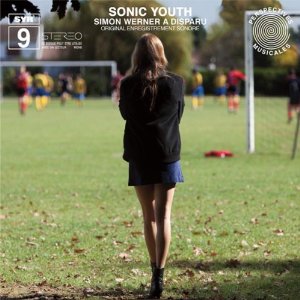Releasing soundtracks to low-budget French psychological thrillers? Surely this is exactly what Sonic Youth’s SYR imprint was set up to do. In the fifteen years since its formation, the label’s output and the more commercial concerns of its parent band have become more and more separated, to the extent that 2008’s J’accuse Ted Hughes – SYR’s 41- minute, two track release about the former poet laureate and husband of Sylvia Plath – was sandwiched between the comparatively hit-filled material found on Rather Ripped and The Eternal; all three bearing the Sonic Youth moniker.
2010 saw Thurston Moore and co. return to the freedom of SYR to begin recording Simon Werner a Disparu: a fully instrumental soundtrack to Fabrice Gobert’s film of the same name. The resulting album, released six months later than its cinematic subject, finds the group attempting to augment the unsettling feel of the film, largely by piecing together scraps of half-formed song ideas that drift in and out – sometimes in the suspenseful manner of Lalo Schiffrin’s compositions for Dirty Harry or Bullit – but more often than not with a frustratingly formless and unguided approach.
Opener ‘Thème de Jérémie’ noodles around with some scratched and scuffed guitar string abuse; sporadic notes over a flurry of cymbals accenting an overriding lack of coherence, before ‘Alice et Simon’ kicks things into gear with a mid-paced Sonic Youth groove, eventually fading away into further moody guitar atmospheres. ‘Les Anges au Piano’ opens with a guitar motif that crops up regularly on the album, moving into shimmering reverbed drones and almost Reich-like loop phasing on the ivories, while ‘Chez Yves (Alice et Clara)’ picks up the pace with bursts of determined drumming and Moore scraping psychosis from the strings of his guitar.
Set to the film’s disconcerting premise of teacher-student abduction, the often nonsensical passages of seemingly improvised sketches begin to expose their initial intent, despite occasionally failing to fully realise it. There are, however, many successes. The lethargic menace of ‘Jean-Baptiste à la Fenêtre’ proves that the iconic groups’s sense of harmony has not forsaken them completely, and introduces a musical theme that is revisited many times, most notably on ‘Escapades’. ‘La Cabine au Zodiac’ sits intermingling guitar harmonics over patient cymbal work, eventually blooming into a major chord progression that contrasts nicely with the gloom of previous tracks.
The pretty piano miniature ‘Jean-Baptitse et Laetitia’ hints at what could have been a welcoming direction for the album to take, away from the frustratingly repetitive ‘Thème de Simon’ and the meandering ‘Au Café’.
Bursts of noise similar to those found on Moore’s 2007 solo effort Trees Outside The Academy permeate the album, most gratingly on the ear-splitting intro to ‘Thème de Laetitia’. Final track ‘Thème d’Alice’ collects and extends some of the set’s more lucid ideas into a structured 13-minute package – almost a complete ‘best of’ – and a further extension of this piece could have constituted the soundtrack in its entirety.
As it is, Simon Werner a Disparu is a largely frustrating collection, at times inaccessible and too reliant on its visual accompaniment, at others interesting and full of cinematic potential. It’s telling that compositional ideas from previous SYR releases have been platforms for subsequent Sonic Youth albums, and perhaps this is what the label is all about: a sanctuary for experimentation and scrapbooking, an outlet for musical brain-storming. A touch more consistency and bearing, and Simon Werner a Disparu could be a great starting point for a new album, perhaps more in the vein of 2009’s The Eternal.


